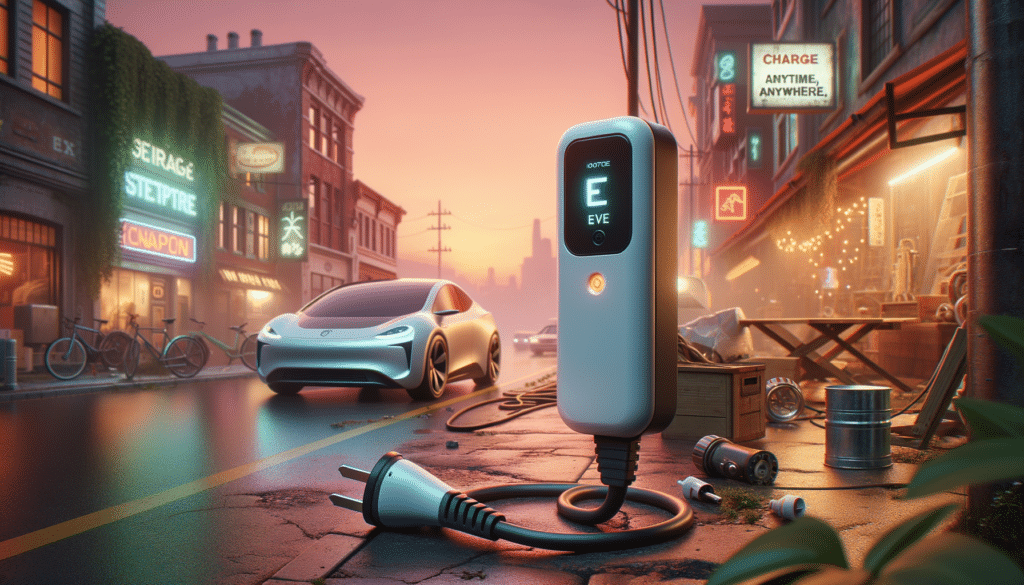The Rise of Electric Vehicles and the Need for Portable Charging Solutions
As the world increasingly shifts towards sustainable energy solutions, electric vehicles (EVs) have emerged as a pivotal component in reducing carbon emissions and fostering an eco-friendly future. With the rise in EV adoption, the demand for efficient and accessible charging solutions has also surged. Among these, the portable EV charger stands out as a versatile and convenient option, offering flexibility and peace of mind to EV owners.
Portable EV chargers are compact devices that allow drivers to charge their vehicles anywhere, anytime. This flexibility is particularly beneficial for road trips, emergencies, or areas with limited charging infrastructure. These chargers are designed to be user-friendly, often requiring just a simple plug-in to start the charging process. They come in various power capacities, catering to different vehicle models and charging needs.
The convenience of a portable EV charger cannot be overstated, especially in scenarios where traditional charging stations are unavailable. For instance, during long drives through rural areas or when parked at a friend’s house without a dedicated charging station, having a portable charger can be a game-changer. It ensures that drivers are not stranded due to a lack of charging options, thus enhancing the overall EV driving experience.
Understanding EV Charging Stations: A Key Component in EV Infrastructure
EV charging stations are crucial to the widespread adoption of electric vehicles. They serve as the primary source of power for EVs, providing the necessary infrastructure to support the growing number of electric cars on the road. These stations come in various types, each offering different charging speeds and compatibility with different vehicle models.
There are three main types of EV charging stations: Level 1, Level 2, and DC Fast Chargers. Level 1 chargers use a standard household outlet and are suitable for overnight charging. Level 2 chargers require a dedicated 240-volt outlet and offer faster charging times, making them ideal for home installations and public charging facilities. DC Fast Chargers, on the other hand, provide rapid charging capabilities, significantly reducing the time needed to recharge an EV.
As the adoption of EVs continues to grow, the expansion of charging infrastructure becomes increasingly important. Governments and private companies are investing heavily in the development of new charging stations, aiming to make EV charging as accessible and convenient as refueling a traditional gasoline vehicle. This expansion is vital for encouraging more drivers to switch to electric vehicles, knowing they can rely on a robust network of charging options.
Advantages of Portable EV Chargers Over Traditional Charging Stations
While traditional EV charging stations are essential for the widespread adoption of electric vehicles, portable EV chargers offer unique advantages that cater to specific needs and scenarios. One of the most significant benefits of portable chargers is their flexibility and convenience. Unlike fixed charging stations, portable chargers can be used anywhere, making them ideal for road trips or emergency situations where a traditional charging station might not be accessible.
Portable EV chargers are also user-friendly and easy to transport, often fitting in the trunk of a car. This portability ensures that EV owners are never without a charging option, reducing the anxiety associated with range limitations. Moreover, the ability to charge at any standard electrical outlet means that drivers can recharge their vehicles even in remote areas without dedicated EV infrastructure.
Another advantage of portable chargers is their cost-effectiveness. While installing a home charging station can be expensive, a portable charger provides an affordable alternative that still offers reliable charging capabilities. This makes them an attractive option for EV owners who may not have the means or space to install a permanent charging station at home.
Challenges and Considerations When Using Portable EV Chargers
Despite their many advantages, portable EV chargers also come with certain challenges and considerations that users need to be aware of. One of the primary concerns is the charging speed. Portable chargers typically offer slower charging rates compared to dedicated charging stations, which can be a drawback for those needing a quick recharge.
Another consideration is the compatibility of the portable charger with different EV models. While most chargers are designed to be universally compatible, it is essential to ensure that the charger you choose is suitable for your specific vehicle model. This includes checking the power requirements and connector types to avoid any compatibility issues.
Additionally, while portable chargers are convenient, they may not be the most practical solution for daily use if faster charging is consistently required. In such cases, installing a Level 2 home charging station might be a more efficient option. However, for occasional use, emergencies, or as a supplementary charging solution, portable EV chargers remain an invaluable tool for EV owners.
Future of EV Charging: Innovations and Trends
The future of EV charging is poised for significant advancements as technology continues to evolve. One of the most promising trends is the development of faster charging solutions that can reduce charging times dramatically. Innovations in battery technology are also underway, aiming to increase the range and efficiency of electric vehicles, thereby reducing the frequency of charging.
Wireless charging is another exciting development in the EV industry. This technology allows vehicles to be charged without the need for physical connectors, offering a seamless and convenient charging experience. While still in the early stages, wireless charging holds the potential to revolutionize the way we power electric vehicles.
Furthermore, the integration of renewable energy sources into EV charging infrastructure is gaining traction. Solar-powered charging stations are becoming more common, providing a sustainable and eco-friendly alternative to traditional power sources. This integration not only supports the green agenda but also reduces the overall carbon footprint of electric vehicles.
As the EV market continues to grow, these innovations and trends will play a crucial role in shaping the future of electric mobility, making it more accessible, efficient, and sustainable for everyone.


